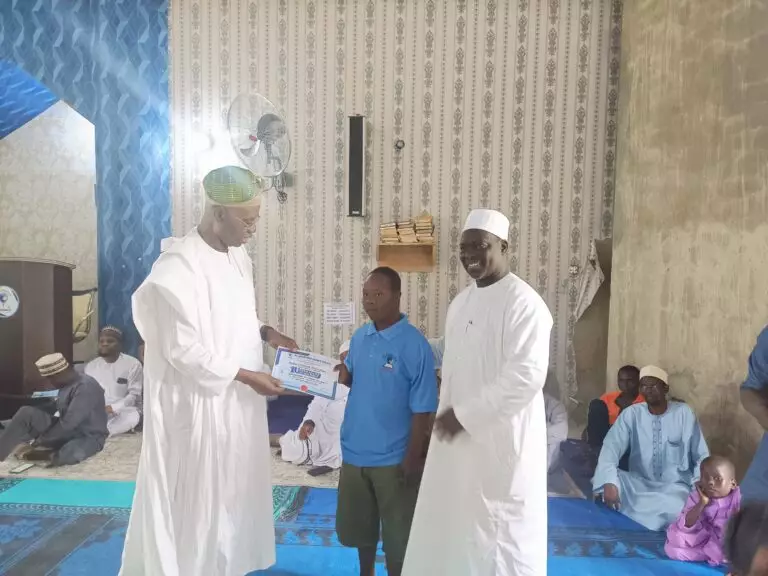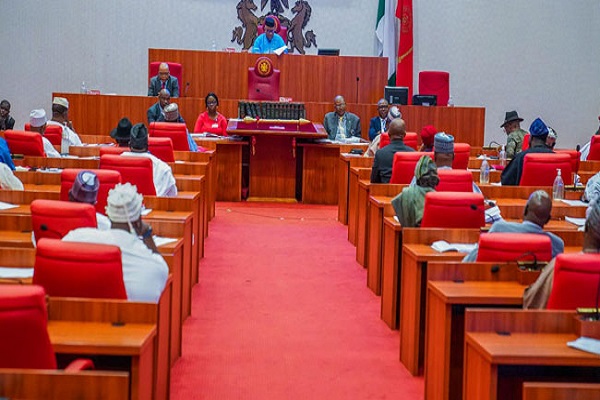News
Al-Habibiyah society sensitises 118 teenagers on effects of corruption

Al-Habibiyah Islamic Society has engaged 118 teenagers on basic principles that would guide them against indulgence in corrupt practices.
The National Chief Imam of the society, Sheikh Fuad Adeyemi, stated this while addressing newsmen at the closing of the 11th Annual Teenagers Workshop, held on Sunday in Abuja.
The News Agency of Nigeria (NAN) reports that the workshop lasted for over a 10-day period, where the 118 children were engaged in several activities at the camp, which had as its theme, “Moulding minds for a corrupt free Society”.
He said the society was determined to improve the moral tone of the country by producing children who are God conscious.
Adeyemi said the main problem confronting the country was corruption, adding, ” that is why we expose the children to everything that will take their lives out of corruption.
” Our aims and objectives are to produce children who are God conscious, who are economically empowered, socially conscious and politically active with the fear of God.”
Adeyemi disclosed that Al-Habibiyah, with the support of the MacArthur Foundation and Human Rights Radio spent over N11 million to organise the programme.
” Our strength for this year is just to engage 70 children but we ended up having 118 children.
“So, it means people overrated us, I said we don’t have money they said we know you can do it.
” But to the glory of God, MacArthur Foundation Human Rights Radio supported us to this level and that was why we did the programme almost effortlessly.
“For the 2023 programme, we spent about N11 million because we do not manage anything.
“During selection of participants, we announced in the mosque and on the Social Media and we even have children from the United Kingdom (UK), Sudan,” he said
On the impact of the programme, the cleric said some of the beneficiaries were studying abroad, adding that they were doing excellently well.
Adeyemi added: ” For example, one of our products is the current Chief Imam of Nigerian students in Cyprus. Almost everybody that goes to Cyprus use to meet him.
” His room become the Mosque of the Nigerian Muslim students and he graduated with a First Class.This is to let you know that we combine everything.
” Also, somebody because of the work we have been doing got a scholarship to the United States of America and she was offered a job because those who do volunteerism work with us get a certificate.
” So, she was offered a job because of her experience in volunteerism here with us.”
He called on the participants to be good ambassadors of not just Islam but “everything good wherever they find themselves.”
The cleric appealed to wealthy Muslims to support Al-Habibiyah with cash or in kind to ensure the sustainability of the programme.
Adeyemi said: ” I beg that those that Allah has blessed should come and support us. You don’t need to give us money, we will tell you what we want you to use the money for.
” Just do it and we will be glad if we see it and if we don’t have enough funding we might begin to charge for the programme.
” We spent an average of N125,000 on each child that participated in the programme. Our intention is to at least have a minimum of 250 participants per annum.”
Speaking on her experience, Farhanaah Adeyemi-Fuad, the Amirah of Al habibiyyah’s 11th teenagers workshop, described the programme as very educating.
She said: ” We had different sessions, we were lectured by several Professors, we had speakers from the Independent Corrupt Practices and Other Related Offences Commission (ICPC), Economic and Financial Crime Commission (EFCC) and NAPTIP.
” They gave us lectures and awareness on several topics and other professionals talked to us about carreer prospects and what you can be.
“Internet doesn’t give you everything, it’s better to have discussions with professionals.”
Headline
Prince Harry visits sick Nigerian soldiers in Kaduna

Prince Harry and his team visited the 44 Nigerian Army Reference Hospital in Kaduna to interact with wounded soldiers who are receiving treatment.
The Duke of Sussex is in Nigeria with his wife to champion the Invictus Games, which Harry founded to aid the rehabilitation of wounded and sick servicemembers and veterans.
Nigeria joined the Invictus Community of Nations in 2022 becoming the first African country to join.
Prince Harry’s visit to Kaduna came 68 years after his late grandmother Queen Elizabeth II visited the state during the time of the late Premier of Northern Region Sir Ahmadu Bello.




News
Senate approves death penalty for drug traffickers

Senate on Thursday, May 9, approved the death penalty for those convicted on the charge of drug trafficking in the country.
The punishment prescribed in the extant NDLEA Act is a maximum sentence of life imprisonment.
The resolution of the Senate followed its consideration of a report of the Committees on Judiciary, Human Rights and Legal Matters and Drugs and Narcotics, National Drug Law Enforcement Agency (NDLEA) Act (Amendment) Bill, 2024.
The Chairman of the Committee on Judiciary, Human Rights & Legal Matters presented the report during plenary, Senator Mohammed Monguno (APC-Borno North).
The bill, which passed its third reading, aims to update the list of dangerous drugs, strengthen the operations of the NDLEA, review penalties, and empower the establishment of laboratories.
Section 11 of the current act prescribes that “any person who, without lawful authority; imports, manufactures, produces, processes, plants or grows the drugs popularly known as cocaine, LSD, heroin or any other similar drugs shall be guilty of an offence and liable on conviction to be sentenced to imprisonment for life” was amended to reflect a stiffer penalty of death.
Although the report did not recommend a death penalty for the offence, during consideration, Senator Ali Ndume moved that the life sentence should be upgraded to the death penalty.
During a clause-by-clause consideration of the Bill, Deputy Senate President Barau Jibrin, who presided over the session, put the amendment on the death penalty to a voice vote and ruled that the “ayes” had it.
But Senator Adams Oshiomhole objected to the ruling, saying that the “nays” had it.
He argued that matters of life and death should not be treated hurriedly, but Barau said it was too late, as he failed to call for division immediately after his ruling.
The bill was subsequently read for the third time and passed by the Senate.
-

 Headline6 days ago
Headline6 days agoSuspend cybersecurity levy– Reps to CBN
-

 Business6 days ago
Business6 days agoNigeria needs over $2bn to revive Ajaokuta Steel Plant, says Minister
-

 Headline3 days ago
Headline3 days agoPrince Harry visits sick Nigerian soldiers in Kaduna
-

 Entertainment4 days ago
Entertainment4 days agoAMVCA Cultural Day: BBNaija’s Neo, Venita win Best Dressed Male, Female
-

 Headline6 days ago
Headline6 days agoTinubu resumes work after foreign trip
-

 News6 days ago
News6 days agoShan George’s money returned to Zenith Bank account
-

 Metro4 days ago
Metro4 days agoEx-Sports Minister laments after hospital neglected him for hours over N80000 deposit



